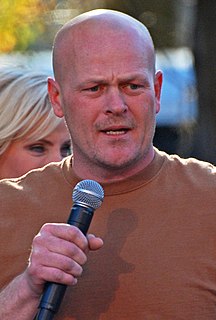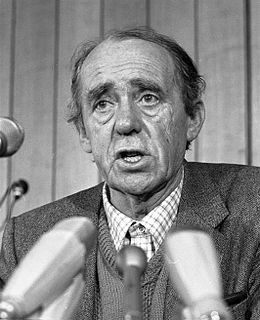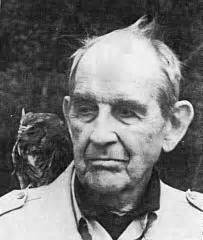A Quote by Tom Wolfe
I used to go through the dictionary looking for unusual but nontechnical words. At one time, I thought the greatest word was 'jejune' and I would throw it into every piece because something about it appealed to me.
Related Quotes
The bold and discerning writer who, recognizing the truth that language must grow by innovation if it grow at all, makes new words and uses the old in an unfamiliar sense has no following and is tartly reminded that 'it isn't in the dictionary' - although down to the time of the first lexicographer no author ever had used a word that was in the dictionary.
The language in New Mexico is very different. At first when you hear the speech here, you don't really know what to do with it, but then I just went with it, because as a writer as well as a translator I do believe that translated words are not different names for the same thing. They're different names for different things. I tried to stay as true as I could, so I used Ruben Cobos' dictionary of Southwestern Spanish, and when I went into Spanish I never assumed the word I would use would be the word a nuevomexicano would use.
He had a word, too. Love, he called it. But I had been used to words for a long time. I knew that that word was like the others: just a shape to fill a lack; that when the right time came, you wouldn't need a word for that any more than for pride or fear....One day I was talking to Cora. She prayed for me because she believed I was blind to sin, wanting me to kneel and pray too, because people to whom sin is just a matter of words, to them salvation is just words too.
Behind every word a whole world is hidden that must be imagined. Actually, every word has a great burden of memories, not only just of one person but of all mankind. Take a word such as bread, or war; take a word such as chair, or bed or Heaven. Behind every word is a whole world. I'm afraid that most people use words as something to throw away without sensing the burden that lies in a word.
I've always been fascinated by books. When I was young, my grandfather used to hand out a book - which would be anything from a biography to a classic - to me every week and ask me to write a piece on what I thought about it. On the other hand, my mother used to love reading thrillers and bestsellers.
What is the good of words if they aren't important enough to quarrel over? Why do we choose one word more than another if there isn't any difference between them? If you called a woman a chimpanzee instead of an angel, wouldn't there be a quarrel about a word? If you're not going to argue about words, what are you going to argue about? Are you going to convey your meaning to me by moving your ears? The Church and the heresies always used to fight about words, because they are the only thing worth fighting about.
I never thought that it would take me so long to do something. I thought everything was temporary and sometimes the best thing you have working in your favor is a bad sense of time. In order to sit down and write a book that takes six years you have to have a screwed up sense of time because that's too daunting. No one is going to pick up a pen and a piece of paper and say, "Okay, six years, here we go."































